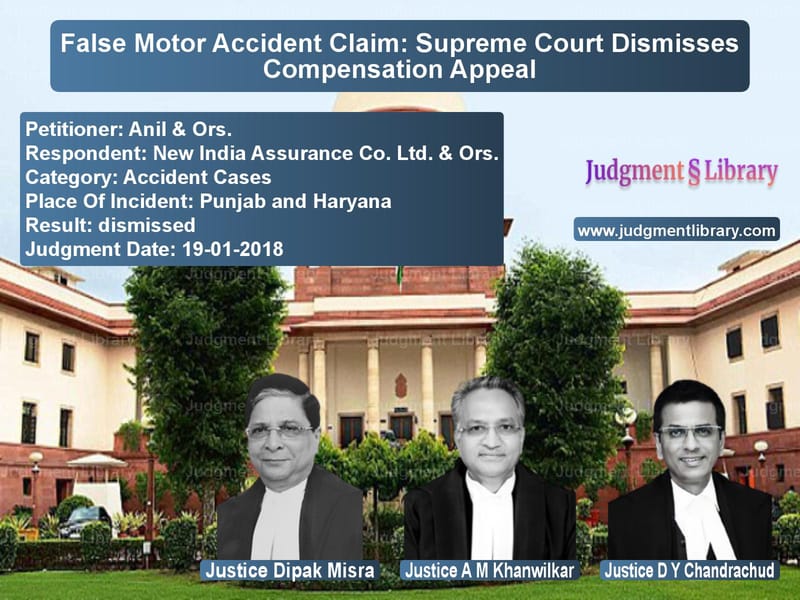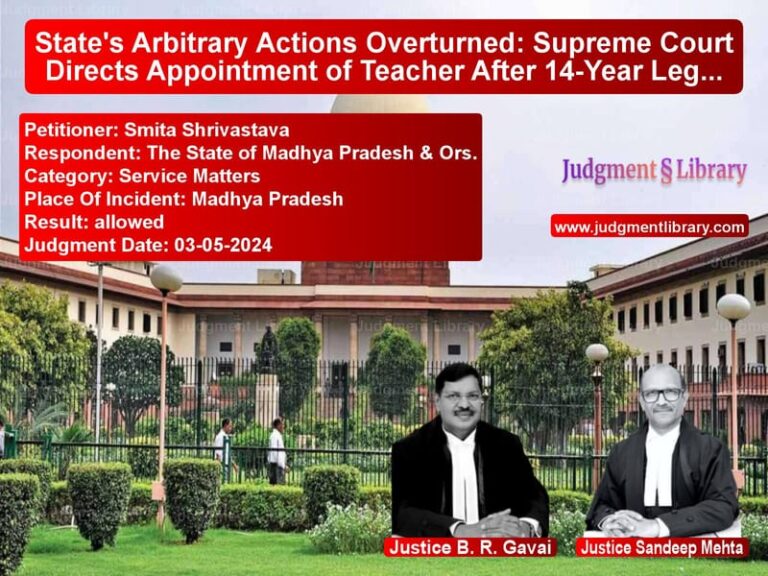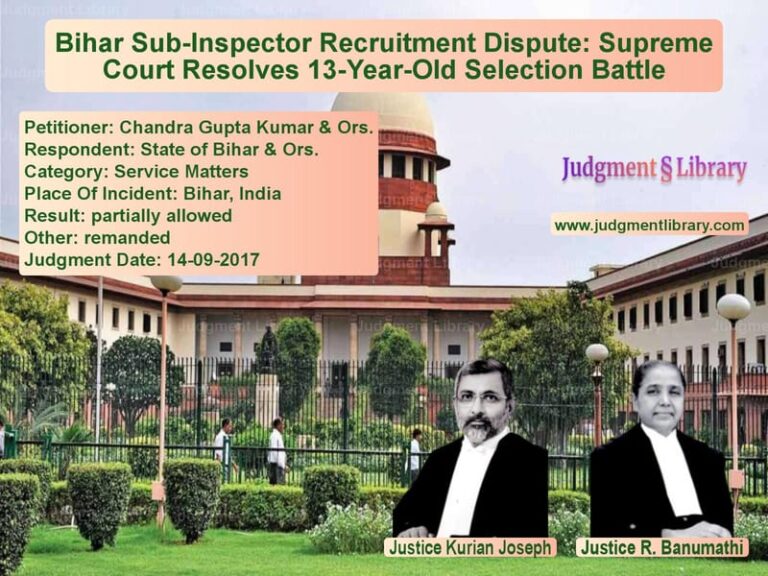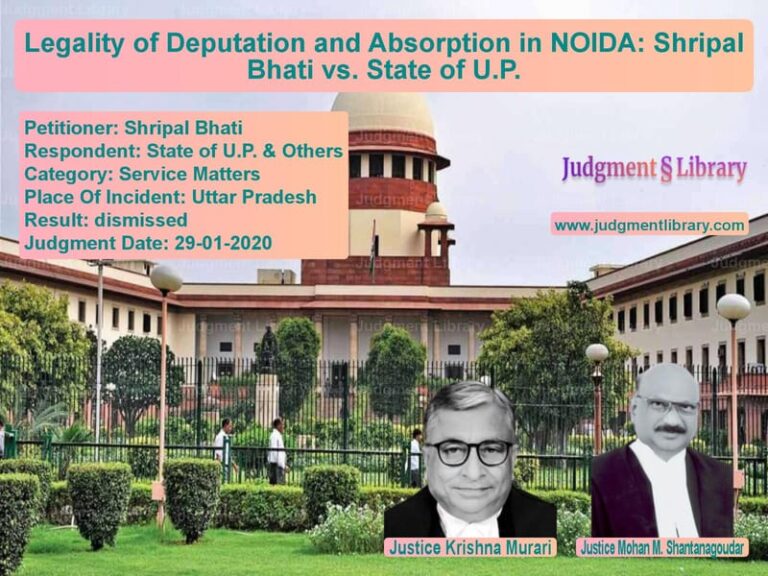False Motor Accident Claim: Supreme Court Dismisses Compensation Appeal
The case of Anil & Ors. vs. New India Assurance Co. Ltd. & Ors. revolves around an alleged motor accident claim that was later found to be fabricated. The Punjab and Haryana High Court, in its judgment dated September 6, 2010, reversed the award of compensation granted by the Motor Accident Claims Tribunal (MACT) on the ground that the claimants had staged a false case to obtain compensation fraudulently. The Supreme Court, in its final verdict on January 19, 2018, upheld the High Court’s decision and dismissed the appeal filed by the claimants.
This case serves as a significant precedent in motor accident claims, highlighting the importance of genuine evidence, the necessity of timely complaints, and the role of medical records in verifying accident claims.
Background of the Case
The claim for compensation was filed by the legal representatives of Ram Kanwar, who was allegedly killed in a road accident involving a tractor. The vehicle in question was owned by Satbir Singh, the brother of the deceased.
According to the claimants, on January 12, 1995, Ram Kanwar had signaled a tractor, driven by Dharampal, to stop. However, the driver allegedly drove recklessly, running over the deceased and causing fatal injuries. The claimants relied on the testimonies of two witnesses, PW1 Bhawani Shankar and PW2 Ghanshyam, who stated that they were present on the tractor when the accident occurred.
The case was presented before the Motor Accident Claims Tribunal (MACT), which awarded a compensation of Rs. 21,38,000 to the claimants, with interest at 9% per annum.
High Court Reversal
The New India Assurance Company challenged the MACT ruling in the Punjab and Haryana High Court. The High Court, upon reviewing the case, found several inconsistencies and termed the claim a ‘brazenly false case.’ Key findings of the High Court included:
- No Post-Mortem Conducted: The absence of a post-mortem report raised serious doubts about the cause of death.
- Delay in Filing Complaint: Despite the alleged accident occurring on January 12, 1995, the FIR was filed almost a month later, on February 15, 1995.
- Conflicting Witness Testimonies: The driver’s statements were contradictory—at one stage, he claimed the deceased was brought dead, while in another instance, he stated that the deceased was referred to a hospital for further treatment.
- No Hospital Records: There were no medical records or reports to establish the nature of injuries or confirm that the death resulted from the accident.
The High Court concluded that the claimants had staged a false case to fraudulently obtain compensation. It reversed the Tribunal’s award and dismissed the compensation claim.
Supreme Court’s Analysis and Judgment
The claimants appealed the High Court’s decision before the Supreme Court of India. The apex court carefully examined the case and upheld the High Court’s ruling, emphasizing that the compensation claim was based on fraudulent grounds.
1. Lack of Medical Evidence
“Significantly, no post-mortem was conducted. The High Court also noticed the fact that though the accident took place on 12 January 1995, a complaint was lodged only on 15 February 1995.”
The Supreme Court found that the lack of a post-mortem report and absence of hospital records seriously undermined the claim. Without such crucial medical evidence, the court ruled that there was no basis to conclude that the death resulted from the alleged accident.
2. Delay in Lodging Complaint
“The person who died was the brother of the owner of the tractor. Hence, the fact that a complaint was not lodged for nearly one month is a significant omission in the case.”
The Supreme Court questioned why, despite the deceased being the brother of the vehicle’s owner, no complaint was registered immediately. The delay indicated an attempt to fabricate a case to claim compensation.
3. Contradictory Statements
“The High Court found that if there were three passengers in the tractor, all of whom had known that driver Dharampal had by his negligent act run over Ram Kanwar, the most natural conduct would have been to lodge a complaint.”
The Supreme Court agreed with the High Court’s observations that the testimonies of the driver and other witnesses contained contradictions. If the accident had genuinely occurred, immediate action should have been taken.
4. Fabrication of Evidence
“Each of the circumstances relied upon by the High Court is germane to the ultimate conclusion that a false case was set up to support a claim for compensation.”
The Supreme Court noted that the claimants had failed to disprove the findings of the High Court. The inconsistencies in witness testimonies, lack of medical evidence, and the delayed complaint all pointed towards a staged accident.
Conclusion
Based on these findings, the Supreme Court dismissed the appeal and upheld the High Court’s decision. It ruled that the claim for compensation was fraudulent and that the MACT had erred in granting the award.
The case serves as a strong warning against the misuse of motor accident claims for financial gain. It emphasizes the need for proper documentation, timely reporting, and credible evidence in such cases.
Don’t miss out on the full details! Download the complete judgment in PDF format below and gain valuable insights instantly!
Download Judgment: Anil & Ors. vs New India Assurance Supreme Court of India Judgment Dated 19-01-2018.pdf
Direct Downlaod Judgment: Direct downlaod this Judgment
See all petitions in Compensation Disputes
See all petitions in Motor Vehicle Act
See all petitions in Negligence Claims
See all petitions in Judgment by Dipak Misra
See all petitions in Judgment by A M Khanwilkar
See all petitions in Judgment by Dhananjaya Y Chandrachud
See all petitions in dismissed
See all petitions in supreme court of India judgments January 2018
See all petitions in 2018 judgments
See all posts in Accident Cases Category
See all allowed petitions in Accident Cases Category
See all Dismissed petitions in Accident Cases Category
See all partially allowed petitions in Accident Cases Category







